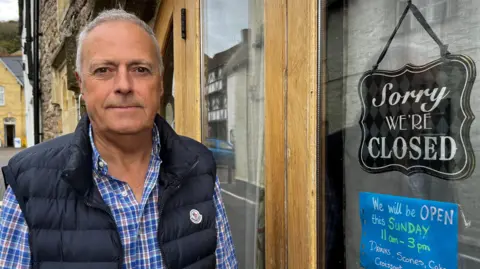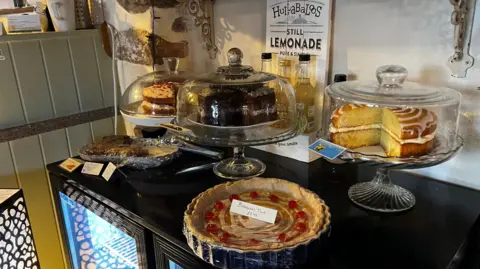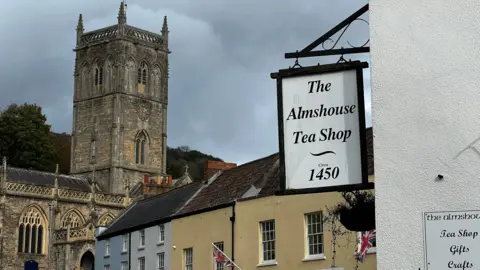 BBC
BBCA man who owns a small teashop has urged the Chancellor to change the rules on VAT in her Budget.
Steve Corrick said the current tax rules have forced him to close his Somerset cafe one day a week, to avoid making too much money.
He said the situation “means we’re not employing people today, not serving the local community, it’s crazy”.
The former accountant calculated that opening every day would mean the business would take just enough money to pay VAT, but would then actually be worse off than if they earnt less.
Is he right? And how many others are stuck in the same tax-trap?

Mr Corrick and his partner Linda only took over the teashop in the summer.
He had retired from a successful career as an accountant, so was interested in the small firm’s books.
He said he quickly spotted a problem.
The Axbridge teashop was in danger of making too much money.
Small firms that take less than £90,000 are exempt from charging their customers VAT. But the rules state that once over that threshold, the sales tax must be charged on every transaction.
Cafe on the cliff edge
Mr Corrick put it like this.
“If we take £90,000, we pay no tax. But if we take one more pound over that, we have to pay £15,000 VAT on the whole lot.
“They call it ‘the cliff edge’, and it’s just crazy.”
The teashop occupies a medieval building that was, for centuries, an alms house.
A place of charity. But Mr Corrick does not want to work for nothing.
“We will actually be worse off if we take over £90,000,” he explained.

Of course, it’s unlikely the cafe would earn only a pound over the limit.
So how much more would they have to take, I wondered, to make it worth paying VAT at 20%?
“We’d have to take £140,000 a year,” he explained.
“To earn more, we’d have to be open longer, which means more wages, more energy, more maintenance.
“Only at £140,000 would we actually start to make more money.”
To recoup the tax paid, the cafe has to earn more money, which increases its costs. Profit margins are small, so to earn enough extra profit to cover the VAT, the business has to take another £50,000.
And no, this problem does not only affect one teashop in Somerset.
“Barrier to growth”
In a recent survey, the Federation of Small Businesses (FSB) found that 38% of firms with turnover around the £90,000 threshold cited the VAT rules as a major barrier to growth.
“They don’t want to get over that threshold and suddenly have to pay lots of tax,” explained Sam Holliday, the FSB’s Somerset organiser.
The FSB calculates that if the VAT threshold had been increased every year with inflation, it would now be over £120,000, not £90,000.
“It’s become a major problem for lots of small companies.”
The new Labour Chancellor, Rachel Reeves, has plenty of people offering advice on how to help businesses to grow.
In a small medieval Somerset teashop, Steve Corrick has his own plea.
“Sort this out, or businesses will be held back.”
